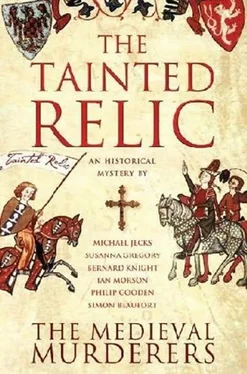Oseney Abbey was one of the glories of Oxford, perhaps of all England. Even from the outskirts of the town, the pinnacled buttresses and stately towers of its new church dominated the water meadows above which the abbey stood. On cold, damp days such as this October one, its yellow stone fabric rose out of the bone-chilling mists that hung low over the marshy ground, criss-crossed with the narrow channels of water that ran into the Thames. Behind its imposing gateway lay the world of court and cloister, infirmary and dormitory. The fine lodgings of the abbot and the canons could not be bettered anywhere in the region. And in the abbey grounds stood mill and tannery, orchards, arbours, dove-houses and fish-ponds.
But it was the church which was its centrepiece. An earlier abbot had begun rebuilding it and the monastic buildings some twenty years previously. The church was nearing completion, but elsewhere building work continued. Brother Robert Anselm had to skirt around the master mason’s crude lodge in the centre of the unfinished cloister court, trampling over the residues of stone-cutting. He ignored the lime mortar dust that clung to the folds of his robe. A building site was a noisy place, and he was eager to seek the quiet sanctuary of the church.
At three hundred and thirty feet long, it was one of the largest churches in England, with a central and western tower and twenty-four altars. But it was more particularly the carefully wrought pattern on the tiles that decorated the floor at the core of the church which attracted him. A series of twelve apparently concentric circles was divided into four quarters representing the four Gospels and the four stages of the mass. Closer examination revealed that the circles were actually a single serpentine pathway with seven abrupt turns in each quarter, leading to the central rose, which bore six bays or petals. Seven, if the very centre was included. This pattern mirrored the great rose window in the western wall of the abbey church, and was the same distance horizontally from the main entrance as the window was vertically above it. So, if the base of the wall had been a hinge, the bright and colourful window would have folded perfectly over its darker image on the floor. Numbers and symmetry mattered to Brother Robert in ways he could not fully explain. And the pattern on the floor tiles was his sanctuary and his contemplative conduit.
It was a holy labyrinth, and for the rest of the day, after his unpleasant experience in a festive Oxford, Anselm sought calm in its serpentine pathways.
‘So, you don’t know who the man is, but you think his arrival in Oxford bodes ill?’
William Falconer smiled wryly at his friend’s perplexing announcement. Bullock, for his part, pursed his lips and outstared the big, raw-boned man who stood before him. Falconer was a Regent Master at the university, teaching the seven liberal arts to a motley band of clerks who formed part of the student body. His only acknowledgement of his status was the threadbare black gown he wore. Eschewing any tonsure or master’s biretta, he went about bare headed, letting his thinning, grizzled hair grow naturally until it was time to hack the tangled length short again. His coarse, ruddy face and hands were those of a labourer, and misled an observer into thinking the man before him was uneducated. Until they saw the sharp, piercing intelligence behind Falconer’s pale blue eyes. It was a look that had scared many a recalcitrant student into submission.
The two men were standing in Falconer’s private solar in Aristotle’s Hall, the student lodgings that Falconer ran to supplement his meagre teaching income. It had been two days since Bullock’s disturbing sighting. He had spent the previous day trying to convince himself that he was being ridiculous. After all, the traveller had been just one more arrival among many in the town for the festival. And nothing untoward had occurred yesterday. But in the end he trusted his instincts, and on this third morning of the festival he had hurried over to Aristotle’s Hall to test his fears on his friend.
The two men stood because, though the room was of sufficient size to accommodate them, it also contained the books and experiments that occupied Falconer’s enquiring mind. They afforded little space for any of the comforts of living. To the left of the chimney breast was a toppling stack of his most cherished books and papers, including the prized works of al-Khowarizmi, the Arab mathematician. To the right of the fireplace were several jars of various sizes, containing potions and pastes exuding strange and exotic odours. Falconer no longer noticed the smells, and had in fact mostly forgotten the reason for some of the concoctions lurking in the pots. A truckle bed was hidden in one corner, for the bulk of the room was taken up by a massive oak table that was both eating surface and workbench. On it there were animal bones, human skulls, carved wooden figures, stones that glittered, and lumps of rock sheared off to reveal strange shapes in their depths. Peter Bullock was used to the chaos.
‘I tell you who he reminded me of. That Templar, Guillaume de Beaujeu.’
Falconer considered this for a moment, then shook his head.
‘No, that cannot be. The last I heard of him, he was in France, and well on the way to becoming the next Grand Master of the Order. His responsibilities would not allow him to travel incognito to Oxford just at the onset of winter. You must be mistaken, Peter.’
Peter’s grunt carried a clear indication of his lack of conviction as to Falconer’s estimate of the man. He hadn’t seen him, and the air of authority and calm that enveloped him more certainly than the warm cloak he had draped around him. True, it was over a year since either man had seen the Templar. And everyone had been preoccupied by the presence of the heathen Tartars in England at the time. He had then been a great help to Falconer in solving a murder. But Bullock wasn’t convinced that this meant they would always be on the same side. The Templars were a secretive bunch, who followed their own devious course through Christendom. On the surface, their duty was to escort pilgrims safely to the Holy Land. In the process they also acted as reliable bankers, ensuring money entrusted to them in the West could be drawn in the East. But everyone reckoned there were deeper currents beneath the surface. So, in Bullock’s mind, if your journey was along a similar route to the Templars, then you could profit from an alliance. But if your paths crossed, you needed to take care. Especially if there was something of value to the Order of the Poor Knights of the Temple in the offing.
‘Well, you may think what you wish, William. But I am prepared to wager that something unpleasant is about to happen.’
As if in response to Bullock’s prophecy, the door of Falconer’s sanctuary was flung open to reveal the dishevelled figure of Miles Bikerdike, one of Falconer’s newest students. He had obviously run some distance, as he stood in the doorway gasping to catch his breath. His face shone with excitement.
‘Master…’
‘Take a deep breath, Miles Bikerdike, and tell me what’s afoot,’ rebuked Falconer. With each passing year, his students seemed to get younger, and more prone to childish behaviour. Falconer could not fathom why. Miles, with his round, fat face and wispy, blond hair, could be taken for a babe in arms. The babe managed at last to blurt out his message, however.
‘Master Falconer. There has been a murder. They say his head has been struck quite off his body.’
Brother Robert Anselm liked to walk the labyrinth. The symmetry pleased him, comforted him, when his mind was in turmoil. It was in turmoil now, and he shuffled round the serpentine route of the labyrinth, striving to concentrate his mind on the four elements of the mass as he moved from one quarter to another.
Читать дальше












